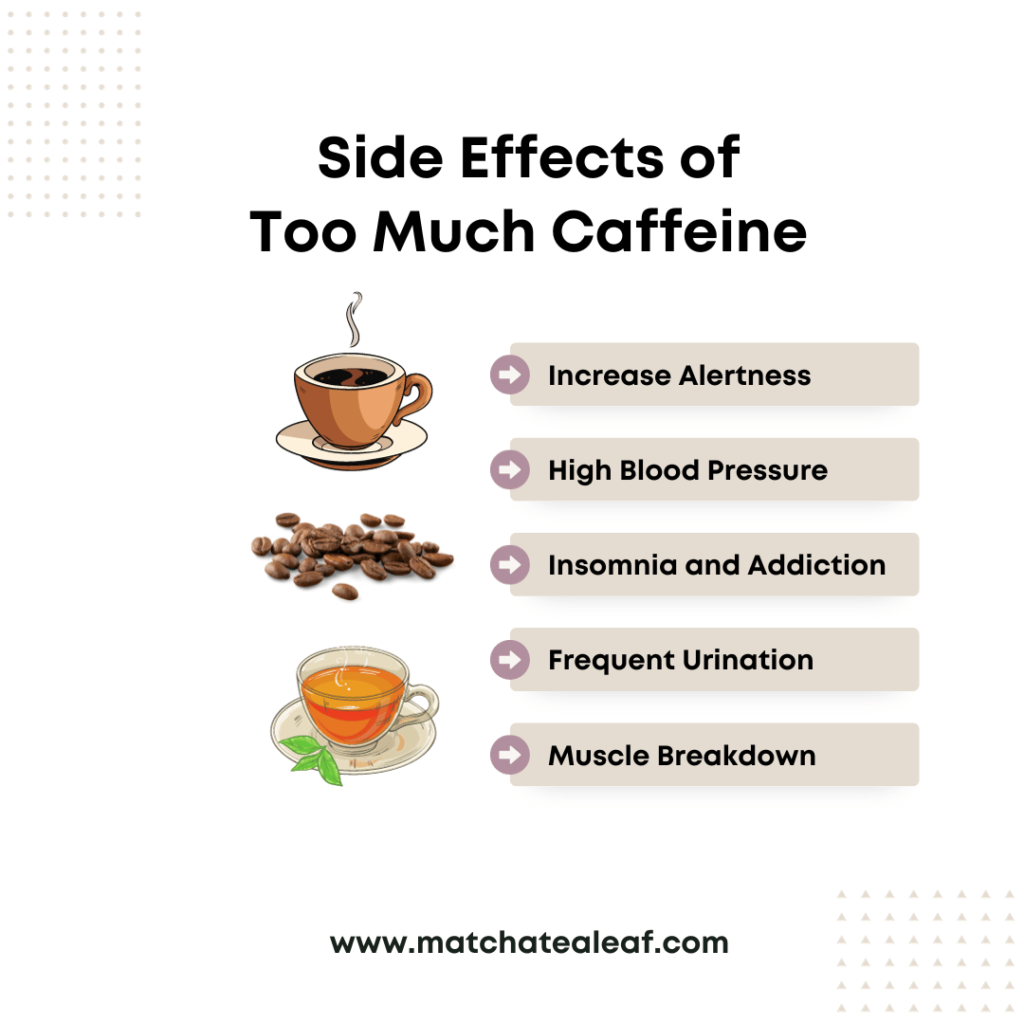
Caffeine, found in various foods and drinks like coffee and tea, is a psychoactive substance that stimulates our central nervous system, wards off sleep and increases alertness. Understanding Caffeine’s effects, its presence in coffee and tea, and its impact on health is crucial for aficionados and the average consumer.
What is caffeine?
Caffeine was discovered as a constituent of coffee in the early 19th century and has since been identified in various other food items, including tea. Later, it was found in tea leaves and cacao, too.
Humans have consumed caffeinated beverages for thousands of years, with tea drinking dating back to ancient China and coffee to the Sufi monasteries of Yemen in the 15th century. Caffeine use has evolved significantly, influencing trade routes, social customs, and even political and economic policies.
Caffeine in Coffee
Various factors affect coffee’s caffeine content, including the coffee bean type, the degree of roast, and the grind size. Other influencing factors are brewing time and the Temperature at which coffee is brewed.
The two most widely consumed types of coffee beans (seeds of coffee) are Coffea arabica (Arabica) and Coffea canephora (commonly known as Robusta). Arabica beans are more prevalent and generally considered superior in flavor, while Robusta beans are more bitter but higher in caffeine content.
The caffeine content in coffee can vary dramatically depending on the brewing method. Espresso, for instance, contains more Caffeine per ounce than regular drip coffee, but because the servings are smaller, a full cup of drip coffee typically contains more total Caffeine.
- Robusta Coffee Beans contain about 2.2% to 2.7% caffeine by dry weight. This higher caffeine content is one reason robusta beans are often used in espresso and instant coffee blends.
- Arabica Coffee Beans are widely consumed and generally considered higher-quality beans. Arabica typically has about 1.2% to 1.5% caffeine by dry weight. Despite having less caffeine, Arabica beans are favoured for their smoother, more desirable flavours and lower acidity.
Caffeine in Brewed Coffee
When it comes to brewed coffee, here’s a general idea of caffeine content:
- An 8 oz (240 ml) cup of regular brewed coffee contains approx. 95 mg of caffeine can range between 80-100 mg depending on the specific bean, roast, and brew.
- A typical single shot of espresso (about 1 oz or 30 ml) has about 63 mg of caffeine. However, because it’s served in smaller quantities, the total caffeine is less than a full cup of brewed coffee, but it’s more concentrated.
- Instant Coffee usually has less caffeine than regular brewed coffee, with about 30-90 mg per 8 oz (240 ml) cup.
- While decaffeinated coffee is not completely caffeine-free, it has substantially less caffeine, typically about 1-2 mg per 8 oz cup, but it can be as high as 7 mg.
Caffeine in Tea
Camellia sinensis plant is the source of most teas: green, black, white, or oolong. However, the nature and properties of these types of teas are affected by the level of oxidation of the leaves. The less the leaves are oxidized, the lighter the kind of tea.
The Caffeine contents in tea depend on various factors like ,specific tea variety ,brewing time, temperature, and caffeine extraction process to affect the amount of Caffeine in tea.
The longer and hotter you brew the tea, the more Caffeine is extracted. However, over-brewing can taste bitter, especially in green and white teas. Here are estimated caffeine levels in various types of teas
- Black Tea: Ranging from 3% to 5% of its dry weight. A typical cup might have anywhere from 40 to 70mg of Caffeine.
- Oolong Tea has around 2-4% of its dry weight as Caffeine. A typical cup might have 30-50mg of Caffeine. While green tea generally contains less caffeine, understanding [green tea health benefits](link-to-target-article) requires knowing the differences between varieties like matcha and sencha. When comparing matcha vs sencha green tea for skin benefits, matcha’s concentrated antioxidants make it particularly effective for addressing acne concerns.
- Green Tea generally has a bit less Caffeine than black or oolong teas, with Caffeine making up about 1-3% of its dry weight. A typical cup of green tea might have 20-45mg of Caffeine.
- White Tea: Often contains the least amount of Caffeine, usually around 1-2% of its dry weight. A typical cup might have 15-30mg of Caffeine.
- Matcha: So , How much caffeine is in matcha tea?. Caffeine is approximately 3-4% of its dry weight because the whole leaf is consumed, meaning a typical serving has about 35-70mg of Caffeine.
What about the Health Implications of Caffeine?
While Caffeine is celebrated for its ability to increase alertness and concentration, excessive intake can lead to restlessness, insomnia, heart palpitations, and other issues. Understanding how Caffeine metabolizes and affects various bodily systems is crucial. It has a diuretic effect, can increase digestive activity, and affects the central nervous system.
Individual tolerance to Caffeine can vary significantly. Some may experience adverse effects with small amounts, while others can consume much more without negative consequences. Recognizing personal limits and the recommended daily intake is important for maintaining health.
Toxicity of Caffeine
Caffeine toxicity can occur when someone consumes too much caffeine. Symptoms of caffeine overdose may appear as soon as 15 minutes after consumption of coffee or tea :
- Seizures
- Tachycardia (rapid heart rate)
- Vomiting
- Restlessness
- Anxiety
- Tremor
- Difficulty sleeping
Caffeine is a stimulant found in coffee, tea, soda, and energy drinks.The amount of caffeine that can cause an overdose varies from person to person.
Which is better healthwise – Coffee or Tea?
While both beverages contain Caffeine, they also have their own sets of additional compounds like antioxidants, which can have various effects on health. The overall impact also depends on the quantity and frequency of consumption.

✓ Expert Reviewed: This content has been reviewed by qualified professionals in the field.
Last Updated: January 22, 2026
Disclaimer: Content is for informational purposes only. Professional advice should be sought for specific situations.
Editorial Standards: The Tea Research Team at matchatealeaf.com unites premium tea industry professionals with advanced AI research tools to create deeply informed, engaging content on matcha, green tea, and black tea. Drawing from years of firsthand experience and global industry insight, the team blends tradition with technology, ensuring every article is accurate, inspiring, and rooted in genuine expertise—making us a trusted source for tea lovers worldwide. All content follows strict editorial guidelines with fact-checking and expert review processes. Read more about Tea Research Team